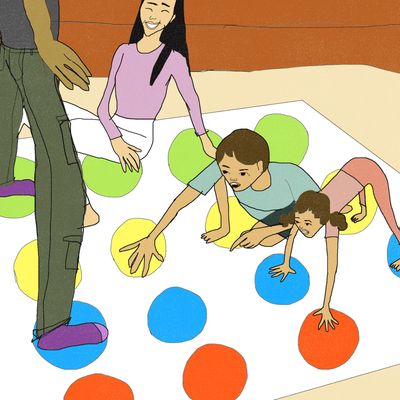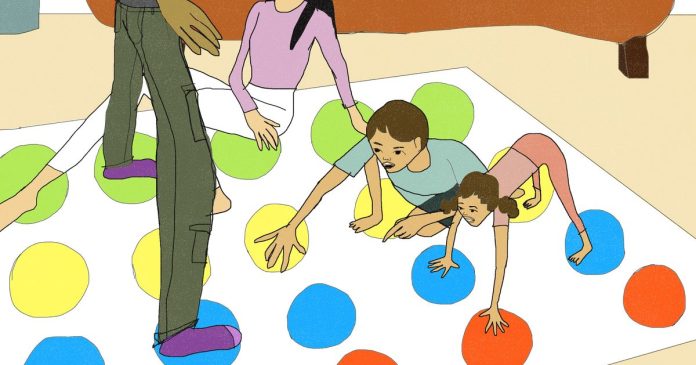By Kathryn Jezer-Morton, a columnist for the Cut covering modern family life. She is the author of the newsletter series “Brooding.” She has written about domestic life and digital culture for the New York Times, The Nation, The Guardian, and Jezebel, among many other publications. She got a PhD in Sociology from Concordia University in 2022.

Illustration: Hannah Buckman
New York subscribers got exclusive early access to this story in our Brooding newsletter. Sign up here to get it in your inbox.
When was the last time you experienced an adrenaline rush while playing a game with your kids? This had never happened to me in my life until two weeks ago, and I’m still thinking about it.
I did not come from a game-playing family, and so I grew to be a games-blind person. I don’t know how to play games; when people try to teach me, I struggle to learn, probably because I don’t care enough about winning to really pay attention. Games that require any real strategic thinking feel cognitively painful for me. When I am forced to play games with children, they always beat me, and not because I let them.
My inability to play family-friendly games is one I come by honestly. The only memory I have of ever playing a game with my mother was from when I was around 11, and we played charades one night at a crumbling beach cottage with some of her friends. I had to act out The Iliad, having no idea what that was. No disrespect to my mom, but I want to do better than this for my kids. But it’s a struggle.*
So I was surprised to find myself that night a few weeks ago lying face down under a spruce tree, trying to quiet my breathing while aware that there were surely slugs near my face. We were visiting some family friends whose 21-year-old twin sons are idols to my kids. They had proposed a game of “kick the can” — a nighttime game that, luckily, is simple enough for someone with my limitations to grasp.
Hiding in the dark while someone walks past the shadow inside of which you are lying very still — this is a primal experience. When I chose my moment to break out into the open and make a run for it to kick the can, I ran like a 10-year-old, so hard and fast I nearly peed.
Becoming a games family is now my ultimate familial aspiration. I’m proud to have “raised readers,” as the experts put it, but having done that, I want to have also raised players — people who are game for games in general, who are fair and reasonable and can play gracefully with others, whether they are better or worse players. Maybe this is the same thing as “good sportsmanship,” but it also implies a curiosity about new games themselves, an ability to pick up rules easily and intuit the stakes.
To me, these are precious skills. Someone who is good at games, whether we’re talking cards, or kickball, or Carcassonne, possesses a secret handshake into a good-natured society of people who know how to have a low-intensity good time. They don’t ragequit (as the kids call it); they don’t gloat. Despite involving competition, game-playing is a social equalizer that allows us to hang out with people with whom we might not have much in common. It gives adults and teenagers a way to be together without forcing conversation and enforcing old, fraying power dynamics. It lets snobs like me off the hook from constantly having to identify myself as smart and cool in every aspect of my godforsaken life. Like, yes, games are kind of dorky: What a relief.
There’s a family on social media that I began following years ago while doing my doctoral research on family influencers. They travel the world with their three kids and call themselves the Bucket List Family. They are, not at all surprisingly, Mormon. (I do not mean this facetiously at all: Mormons have always been at the forefront of family influencing. Back in the blogging era, the Church of Latter-day Saints formally encouraged moms to start blogging. Also, Utah, where many Mormons live, has the highest median household income in the country, which makes it easier to “make memories” in ways that look great in high resolution. That being said, the Bucket List Family is very wealthy by any state’s standards.)
I have been offhandedly watching the Bucket List Family do fun things together for years — mostly for professional rather than personal reasons, if you can believe it — and only recently, I mean, like, last month, while watching a video of them helping their youngest child learn to do a 360 on a wakeboard off the back of their boat, have I ever felt a pang of regret that I’m not more like them. It’s not the wakeboarding itself that compelled me but rather the seemingly endless patience the parents had for watching the kid fall and get back up, cheering him on and waiting, like sports fans watching their favorite athlete, for him to come through and stick the landing. They are laser-focused (at least in the edited video), all in on the challenge. Mormons make very compelling family influencers for another reason: Most of them are sober. I suppose my idea of fun might overlap more with my kids’ if I didn’t have such an affinity for drinking gin-and-tonics and gossiping at 6 p.m.
I didn’t think much of my indifference to games for the first decade or so of being a parent. My husband and I had decided when our kids were still infants that we believed in a firm boundary between what we called “kid world” and “adult world.” To our way of thinking — and, to be clear, this was us as new parents, blissful in our ignorance about what parenting really is — we wanted our children to feel free to be kids and for ourselves to feel free to be adults. Maybe this was a response to our own “parentified” childhoods, where we were constantly overhearing adult conversations we didn’t understand and wished we hadn’t heard. It was also probably a reaction to intensive parenting generally, in which parents feel obligated to be more involved in every aspect of their children’s lives, including their games. Not us, we said to ourselves.
And, you know, for the first decade, it kind of worked. But during the pandemic, as we had to push ourselves to find things to do together, I began to feel the pain of my limitations and wished I were different. I had never before worried about being more of a “fun mom,” but as my kids have grown old enough to do things that I might also enjoy, that self-doubt has begun to creep in. During those COVID years, my husband taught my kids to play Dungeons and Dragons, and they embarked on long, elaborate campaigns that they still talk about sometimes. I loved that for them, but you could not have paid me to participate. Which made my unexpected glee while playing kick the can feel all the more like a victory for me and all my flaws and cynicism. Maybe there’s hope for me yet.
*There is one game I do enjoy, and if I’m made fun of for it, I deserve it: It’s an out-of-print game called Ex Libris, published at one time by Oxford University, wherein you are assigned a famous book from the past, and your goal is to write a version of the book’s first or last sentence in such a skillful way that you convince your opponents that your version is in fact the original. The target market for Ex Libris is pretty small (nerds; English majors), and almost everyone else absolutely hates it and finds it low-key exclusionary and rude, which it is. Children, obviously, are not included at all. My mother-in-law taught me this game (she plays all kinds of games, though, not just snobby ones), and we usually play it over the holidays. It gets heated, make no mistake. Remember that time when you wrote a pitch-perfect first line of Dubliners and won all the points?
Are Families Who Play Games Superior?

